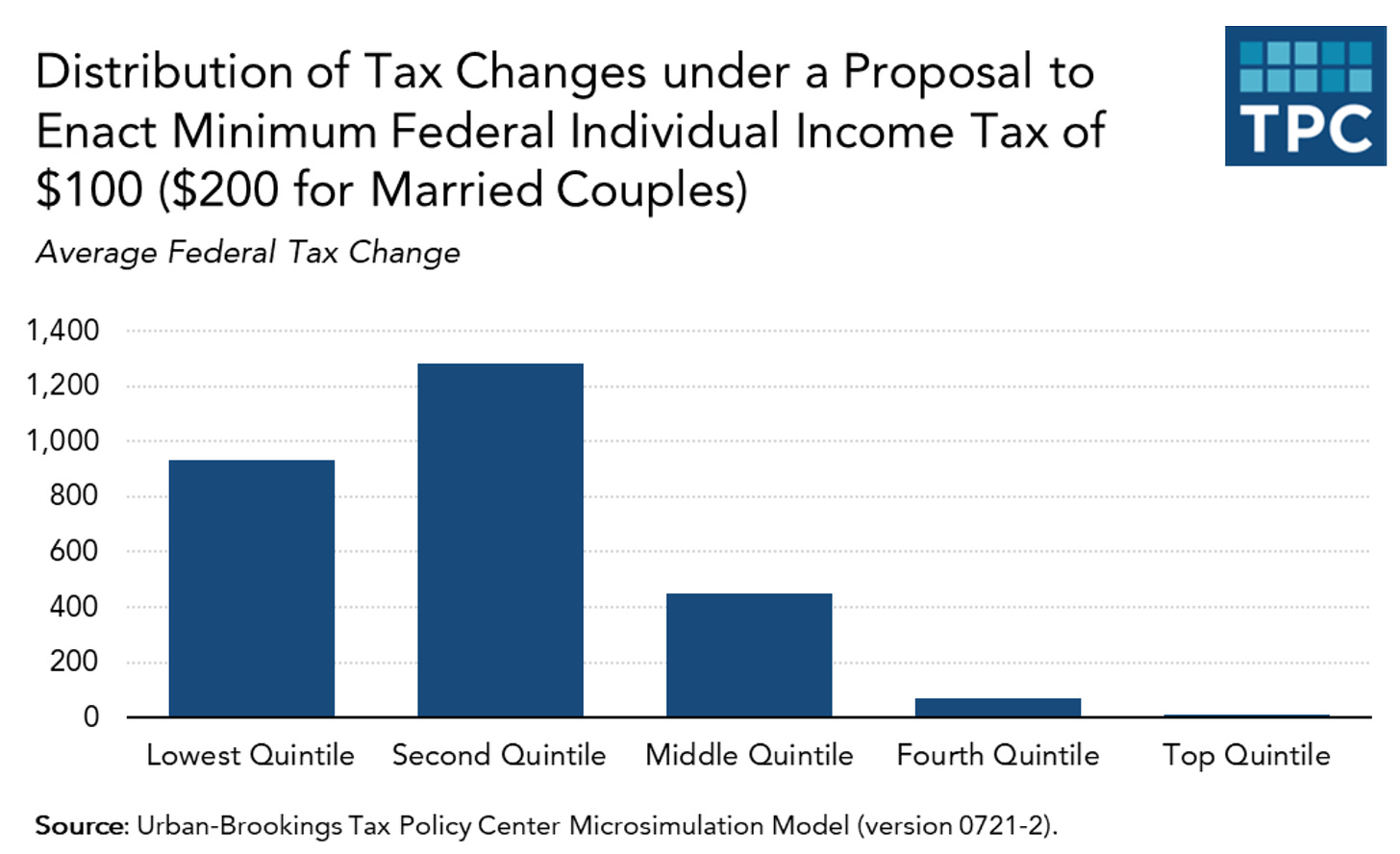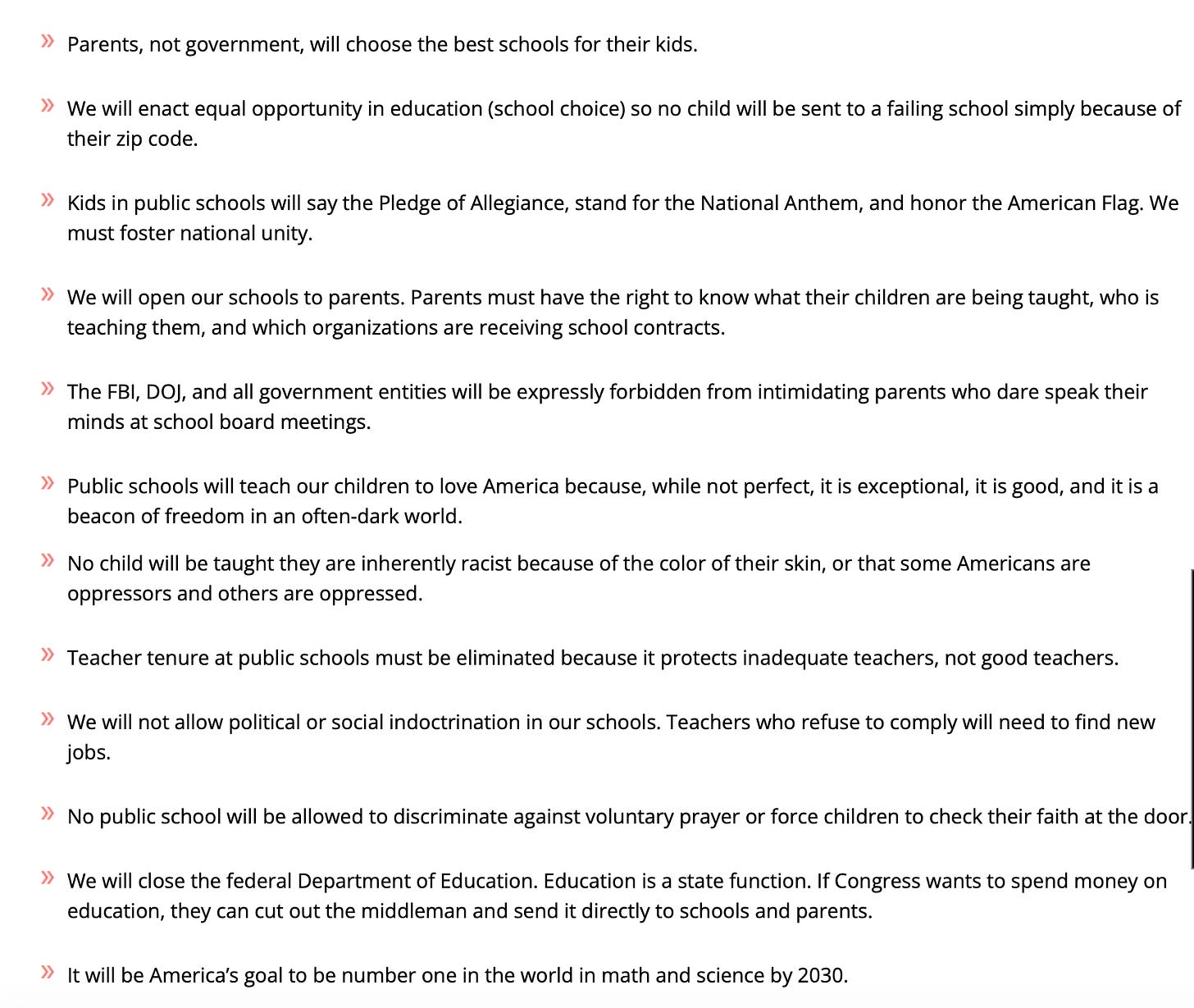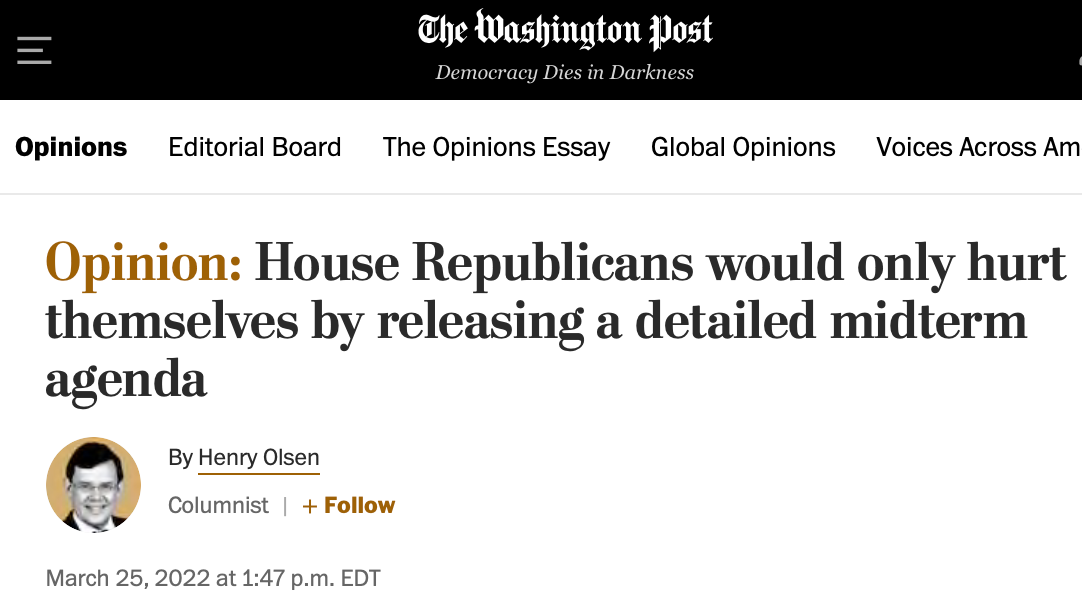Rick Scott's midterm plan is nuts
It would trash the economy and dismantle the federal government
Chances are that Republicans will control Congress next year, so maybe we should know something about what their plans are. Turns out that is quite hard to do. Rick Scott, who chairs the National Republican Senatorial Committee, has promoted Rescue America plan. While it’s not the official GOP midterm plan, it’s the closest thing we’ve got.
The plan is modeled on Newt Gingrich’s Contract with America that saw Republicans take control of Congress in 1994. Newt even features in on the plans website endorsing it. If the GOP does retake control, expect Scott to try to claim the credit. He has already run a national spot around the plan.
There is only one problem with the Rescue America plan, and it’s a big one.
It’s nuts.
A fever dream of the unconstitutional and impossible. A blueprint for tanking the US economy, destroying state capacity, state-sanctioned discrimination and removing individual rights.
Ok, maybe more than one problem.
The tax stuff you might have heard about is bad
Scott’s plan has gotten the most notice for his proposal that “all Americans should pay some income tax to have skin in the game, even if a small amount.” This would effectively mean rcreating tax hikes for low income earners and the elderly, making the tax system more regressive. For example, if you required that all people had to pay $100 in income taxes, that would mean that 80% of the tax increase would be borne by the lowest income groups.
The parts you might not have heard about are worse
But there is plenty of crazy to go around. Parker Molloy has written about how the plan seeks to erase trangender people for example.
There are whole areas of the plan — immigration, criminal justice, family, religious liberty and big tech, and America first — that I won’t get into. Since I write about policy and government, I am going to focus on those parts of the Rescue America plan.
The 13 worst parts of Scott’s 11-point plan
“All federal legislation sunsets in 5 years. If a law is worth keeping, Congress can pass it again.” The idea of sunset laws has been around since the 1960s, proposed as a way of keeping government growth in check.
It’s a terrible idea for a number of reasons. Scott’s plan is to put one fifth of existing legislation through the policy process each year. By one very approximate estimate there are 30,000 laws on the books. By another estimate, Congress generates 4-6 million words of law in each session. How on earth would Congress process such an extraordinary increase in workload?
Have you seen anything that makes you think that Congress could agree to pass massive amounts of crucial legislation on a regular basis? The planet is burning (or as the Scott plan puts it “weather is always changing”) and we can't pass the most basic climate change legislation. We can’t even get hearings for political appointees. Put Medicare up for renewal every five years? The Social Security Act?
Political systems can manage only so many complex decisions and conflict at a given point in time. Force them to do too much and they break down.
Agreeing that past legislation remains the status quo unless policymakers actively decided to change it is the only means of ensuring that the system does not become overloaded. What I am describing is the political theory of incrementalism, most associated with Charles Lindblom and Aaron Wildavsky. They argued that incrementalism was a good way of making policy, because it directed limited policymaker attention to a small number of issues at a given point in time, allowing them to give those policies deeper attention.
Sunset laws would also reduce policy predictability. This is bad for individuals, who can’t plan if Medicare will still exist for them in a couple of years. But it’s really bad for investors and businesses. You run a business and you don’t know if all of the policies that affect employment and regulation will still be there in a year or two? Not ideal for planning ahead or raising investments.
“Move most Government agencies out of Washington and into the real world.” Sounds reasonable, right? Here is the thing. We have already done this. Five out of six civilian federal employees live outside of the DC region. Pushing more people to leave the DC region will lead to a loss of talented professionals. When Trump forced Department of Agriculture scientists to relocate to Kansas City, it led to a mass exodus of about 75% of staff, and enormous disruption to the mission of the unit.
“Enact term limits for the Washington ruling class – 12-year limits for Congress and government bureaucrats.” About the only thing you can get political scientists to agree upon is that term limits are a bad idea. It’s also a bad idea for bureaucrats. The best evidence we have is that bureaucrats out-perform political appointees in managing government performance because of their experience. Bureaucrats are more likely to invest in expertise that is specific to the public sector and has less value in the private sector if they know they have job stability. Reduce the time horizon for their service, you get less competent bureaucrats who have less reason to be good at their job.
“We will balance the federal budget. It can be done. States do it all the time” & “Prohibit debt ceiling increases absent a declaration of war.” This enormous reduction in fiscal spending would create a 1930’s style depression. It would also mean slashing entitlements, discretionary and defense spending. The federal budget ran a $3.1 trillion deficit in fiscal year 2020. The deficit is unusually large now because of the pandemic. But with a balanced budget requirement the pandemic would have destroyed the US economy.
For some perspective, defense spending represents about $700 billion. Non-military discretionary spending — housing, transportation, veterans assistance and more — is about $900 billion. Even in more normal times, balancing the budget would mean a huge transformation in the basic role of American government, and necessarily gutting popular programs. Scott wants for force this transformation, but not explain what should be cut along the way.
“We will immediately cut the IRS funding and workforce by 50%.” The IRS has already experienced a long-term decline. Between 1992 and 2020, the US population grew by 28% even as IRS staff declined by 35%. What does this mean in practice? The agency currently has one staff person for every 16,000 calls it gets. The current IRS Commissioner, a Trump appointee, said: “If the IRS budget was cut by 50%, you might be better off and save more money by just shutting it down completely.” Maybe that’s the plan!
Scott responded by complaining about the complexity of the tax code: “If you can get lawyers and accountants you can figure out how to not pay taxes, it shouldn't be that way." Scott would know. He has used complex tax loopholes exploited by the ultra-rich to avoid paying taxes. Continuing to defund the tax police just makes it certain that revenues will be lost, and patterns of massive tax evasion by the ultra-rich will continue.
“Eliminate truly non-essential government employee positions, because they are non-essential.” This sounds tautological, but has a meaning. When government shutdowns occur, the federal government must have a plan to prioritize which parts remain open and which do not, so some employees are deemed non-essential (technically, the language was changed to “non-excepted” in 1995, but non-essential has stuck). By one estimate that is about 1 in 4 federal employees. In other words, Scott envisions a permanent government shutdown. Think back to the last one in 2018. Delays in air travel. The closure or trashing of unsupervised national parks. That sort of thing. Scott’s plan also ignores the real per capita decline in the number of federal employees over time. As a percentage of the population, the federal workforce was 1.13 percent in 1967 but shrank to 0.64 percent in 2018.
“We will inspire patriotism and stop teaching the revisionist history of the radical left; our kids will learn about the wisdom of the US Constitution, the Bill of Rights, and the founding fathers.” I don’t have the energy to go through every part of Scott’s education plan (below), but suffice to say that while many aspects of Rescue America outline a vision of a smaller federal government, Scott calls for a massive federal takeover in education, including curricular control, and determining teacher employment conditions. This will somehow happen despite getting rid of the Department of Education.
“Kids in public schools will say the Pledge of Allegiance, stand for the National Anthem, and honor the American Flag.” Ok, I’m just going to take this one specific point of Scott’s education plan by noting that it is plainly unconstitutional. Students have a constitutional right to not participate in the pledge of allegiance without fear of punishment or retaliation.
Not proposing obviously unconstitutional laws seems like a low bar for policymakers!
“Implement the line-item veto. It works in state capitols. It will work in Washington.” Again, unconstitutional. Previously tried. The Supreme Court ruled on this, saying that it would effectively give the President legislative powers to amend bits and pieces of laws, and nothing in the constitution permitted that.
Are there any interns working in the Scott office who could look this stuff up?
“Government will not ask American citizens to disclose their race, ethnicity, or skin color on any government form.” We will no longer ask about racial categories in the Census. If there are racial disparities, we don't want to know about them.
“We will stop dividing people by race, skin color, ethnicity, or country of origin, which is an immoral and corrosive habit of the woke crowd.” We solved race in America. Time to move on.
“Socialism will be treated as a foreign combatant which aims to destroy our prosperity and freedom.” I am genuinely confused about what this means. Are we planning to shoot socialism? Waterboard it at a black site? Send it to Gitmo indefinitely?
“There must be no same-day registration, as this does not allow election officials to verify the validity and accuracy of voter information.” Scott’s proposed federal election policies includes a number of exaggerations and misstatements. This one is just factually incorrect. Same Day Registration means you have to provide your documentation in the presence of an election official. It therefore increases security, and gives the official the chance to correct any errors in the record. It also runs contrary to another Scott goal “We will fight for maximum voter participation and zero percent voter fraud.” Same-day registration has one of the best-established records of increasing voter turnout in a way that does not increase the risk of fraud. This is because registration is one of the biggest barriers to voting. Voters who become interested in voting late in the campaign are essentially locked out if they do not register by the deadline, which is often a month in advance. For the same reason Scott’s opposition to automatic voter registration (“No one should be automatically registered without their consent or knowledge, as this opens the way for multiple registrations by the same individual and registration of ineligible voters”) is wrong, unless you think state officials are engaged in some sort of voter fraud conspiracy.
By the way, did I mention that Scott oversaw a company that engaged in massive Medicare fraud. His company had to pay a $1.7 billion fine but he walked away without punishment, and then transitioned into politics. Maybe not the most credible person to talk about fraud.
We should know about GOP policy plans
Actual GOP policy plans are, if you forgive the hackneyed metaphor, the Bruno of American politics, the thing we don’t like to talk about. After not having a party platform in 2020, Republicans are also skipping any official statement of midterm policies. Mitch McConnell and Scott are feuding about the Rescue America plan, not on matters of substance but because McConnell believes that Republicans are better off if they do not reveal their policies. Its a view shared by the conservative intelligentsia and its probably correct just on purely strategic grounds.
On the other hand there is something disturbing about the notion that one party avoids talking about its actual policy goals. It feels like there is also a double standard here, where Democrats are held accountable for policies that some activists might support, but people controlling the policy agenda largely do not, such as “ostensibly legalizing property crime, crippling the police and injecting social justice into math classes” according to one recent NY Times piece.
Thus, Scott has done us a favor in laying out his plan. And in many ways the plan reflects Scott’s career. He made an enormous fortune overseeing a massive fraud of taxpayers, and now warns us about public sector fraud. He then refused to pay his fair share of taxes from that fortune, and now demands that low income people pay more taxes. When in power he made the social safety net dysfunctional, deliberately undermining Florida’s unemployment system for example. He would like to do this at a national level with all government services. His midterm appeal bets on culture war tropes to distract attention from a ruinous economic plan and the destruction of government capacity.
It’s not pretty, but at least gives voters some information about what to expect.
If you found this post useful, please check out the archive, consider subscribing if you have not done so, and share with others!








